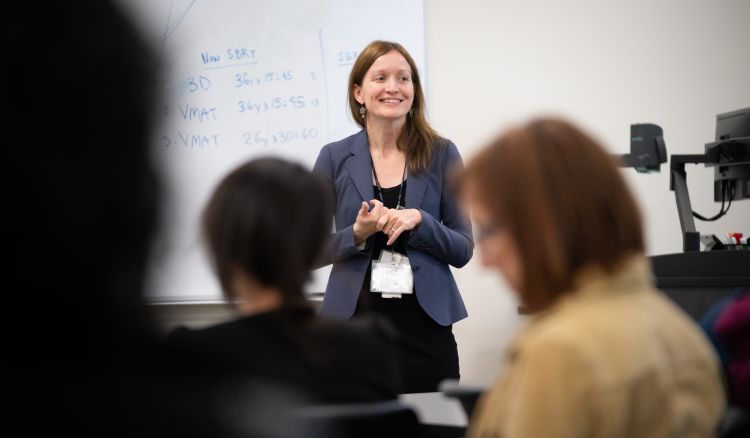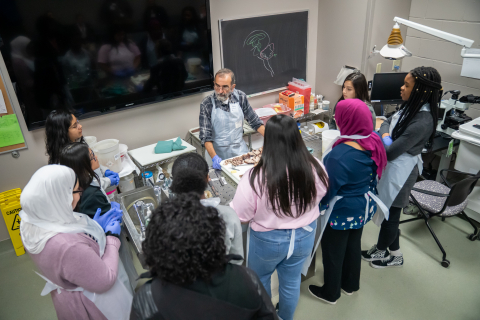Wisconsin Alzheimer’s Disease Research Center hosts high school students for scientist luncheon, brain autopsy observation

The Wisconsin Alzheimer’s Disease Research Center (ADRC) hosted eight area high school sophomores and juniors for a half-day Alzheimer’s disease research experience on November 21, 2019, at the University of Wisconsin School of Medicine and Public Health.
The students are part of the inaugural class of fellows and honorable mentions from the Research Education Component (REC) Junior Fellowship, a program that aims to cultivate the next generation of Alzheimer’s disease scientists.
The students attended a presentation introducing them to dementia research taking place at the University of Wisconsin, had lunch with faculty and research staff, and observed a brain autopsy in the medical school morgue.
“You are part of an elite group of students chosen to learn about neuroscience, research, and the medical field from a diverse range of researchers and clinicians specialized in studying Alzheimer’s disease and dementia,” says Barbara Bendlin, PhD, associate professor, Geriatrics and Gerontology, and leader of the Wisconsin ADRC’s REC, which oversees workforce training and education initiatives on behalf of the center. “The number of people affected by Alzheimer’s disease is on the rise, and we don’t have effective treatments available, so research in this area is extremely important.”
The high school students are all enrolled in UW-Madison’s Precollege Enrichment Opportunity Program for Learning Excellence (PEOPLE). Students who applied to the REC Junior Fellowship wrote essays describing why they were interested and how they may benefit from the program; five were chosen as fellows, eight as honorable mentions.
The fellows will return to the Wisconsin ADRC in the summer before their senior years to take part in a unique four-week research internship. During the summer internship, students will gain hands-on experience in a range of Alzheimer’s disease and dementia labs to add to their journey on the way to becoming the next generation of researchers.
At the luncheon, the REC Junior Fellowship students met several researchers and clinicians within the Wisconsin ADRC. The researchers shared recent developments in their dementia studies, and they explained what drew them to the field of research and how they achieved their professional goals.

Pictured above, the REC Junior Fellowship students joined a group of medical students and UW Health clinicians to observe two brain autopsies lead by Shahriar Salamat, MD, PhD, professor of pathology and director of the Wisconsin Brain Donor Program.
Before beginning the autopsy procedure, Salamat reminded the students of the great honor individuals who donate their brains for research bestow on the medical community, adding that each donation helps advance the field of dementia research for years after a donor’s passing.
The REC Junior Fellowship students observed carefully as Salamat walked them through each region of the brain and described how they were affected pathologically. Salamat encouraged the students to ask questions throughout the procedure, and they provided their own observations about the brain's attributes.
“Experiencing an autopsy under the direction of a distinguished teacher and scholar like Dr. Salamat is an exceptional learning opportunity, and one that many students aren’t able to have until they enter medical school,” Bendlin says.
The REC Junior Fellowship Luncheon offered a distinctive look behind the scenes of Alzheimer’s disease and postmortem research and offered students participating in the REC Junior Fellowship valuable experience in neurological research before they even begin their first years of college.
The REC is funded by the National Institute on Aging and was established within the Wisconsin ADRC in April 2019. It oversees several programs that aim to train the next generation of Alzheimer’s disease scientists. The REC supports educational activities for learners at multiple levels, from high school age to early investigators.
—Tyler Fox
Adapted from "Wisconsin Alzheimer’s Disease Research Center Hosts High School Students for Scientist Luncheon, Brain Autopsy Observation." Wisconsin ADRC news article. Accessed December 4, 2019.
Banner photo: Dr. Barbara Bendlin, leader of the Wisconsin ADRC Research Education Component (REC), welcomes students and scientists to the REC Junior Fellowship Luncheon. Credit: Clint Thayer, Department of Medicine